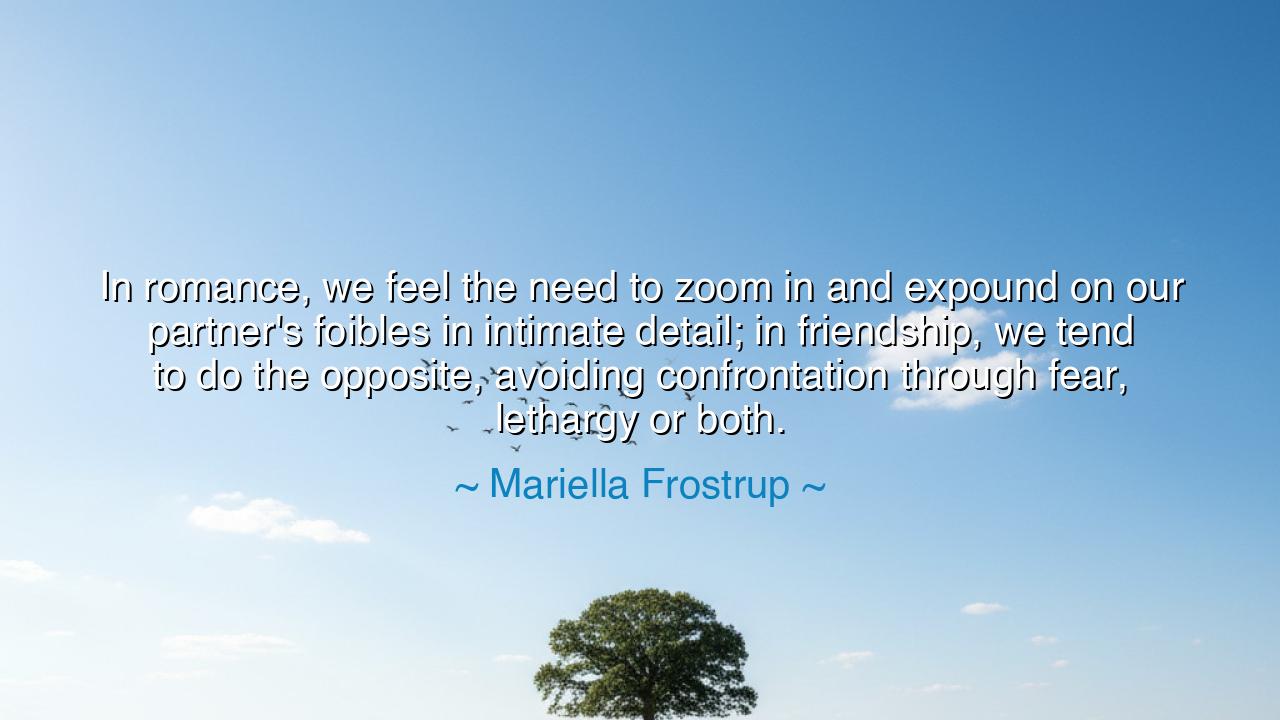
In romance, we feel the need to zoom in and expound on our
In romance, we feel the need to zoom in and expound on our partner's foibles in intimate detail; in friendship, we tend to do the opposite, avoiding confrontation through fear, lethargy or both.






“In romance, we feel the need to zoom in and expound on our partner's foibles in intimate detail; in friendship, we tend to do the opposite, avoiding confrontation through fear, lethargy or both.” — in these words, Mariella Frostrup captures a paradox that lies deep within the human heart. Her observation is not merely about love and friendship, but about the contrasting ways in which we confront — or avoid — truth in our closest bonds. For in romance, passion often sharpens our gaze; we scrutinize, analyze, and dissect the flaws of our beloved as though love itself grants us the right to reshape them. But in friendship, where there is no claim of possession, we often turn our eyes away, preferring peace to honesty, and comfort to correction. Thus, she speaks to the imbalance between intimacy and courage, reminding us that love, whether romantic or platonic, demands truth — and that without it, even affection becomes shallow.
In the ancient world, the philosophers of Athens pondered this very tension. Aristotle, in his meditations on friendship, wrote that a true friend is a “second self,” one who reflects our virtues and our vices. To conceal the truth from such a friend, he warned, is to abandon the moral duty of love. Yet, as Frostrup so eloquently observes, the modern soul often hesitates to hold friendship to this higher standard. We call our friends dear, yet we remain silent when they err, fearing to disturb the still waters of companionship. Meanwhile, in the realm of romance, our emotions drive us to the other extreme — to a restless need to correct, to perfect, to make the beloved into a mirror of our own desire. Thus, we find ourselves torn between overexposure in love and evasion in friendship, mistaking criticism for care in one and neglect for kindness in the other.
Consider the tale of Socrates and Alcibiades, the teacher and the pupil whose bond transcended both friendship and mentorship. Socrates, though affectionate toward Alcibiades, did not flatter him. He spoke the truth — even when it wounded. He exposed Alcibiades’ vanity, his hunger for glory, his moral weakness, not to humiliate, but to awaken him. This, in the eyes of the ancients, was the highest form of friendship — one that valued the soul’s growth above the comfort of silence. In contrast, Alcibiades’ relationships of passion and desire — his romances — were filled with the turbulence of pride and jealousy. There, every flaw became a battlefield. The story stands as a mirror to Frostrup’s wisdom: we often reserve our honesty for those we seek to control, and our silence for those we truly cherish — when it ought to be the other way around.
Frostrup’s insight arises from the heart of modern life, where the boundaries between love and friendship have grown blurred. In the world of romance, we are taught that love is built upon transparency — upon endless communication, self-analysis, and mutual correction. Yet, this scrutiny can become oppressive, turning affection into a quiet war of improvement. We “zoom in,” as she says, until love becomes a microscope, and the beloved a specimen. In friendship, however, we retreat from this kind of honesty, fearing that truth might break what laughter has built. We would rather endure quiet annoyance than risk open confrontation. Thus, we allow false harmony to replace genuine understanding, and the bond weakens not from conflict, but from neglect.
The deeper truth in Frostrup’s words is this: both forms of relationship suffer when they lose balance. Romance without gentleness becomes tyranny; friendship without honesty becomes emptiness. True love — whether passionate or platonic — demands both tenderness and truth, the courage to speak and the grace to forgive. The heart that can correct with kindness and confront without cruelty is the heart that loves in its purest form. The ancients called this virtue parrhesia — the noble art of “frank speech” tempered by compassion.
Let every soul, then, take this lesson to heart: do not let fear or weariness silence your truth in friendship, nor let passion make you cruel in romance. Speak with love, but speak. Correct with humility, but correct. For silence can be as destructive as criticism, and both must be governed by wisdom. To love rightly is to see clearly and to act justly, neither shrinking from truth nor wielding it like a weapon.
In your own life, practice this balance. When a friend errs, speak gently, for honesty is the truest form of loyalty. When a lover falters, remember that love does not demand perfection but presence. Let your friendships be brave and your romance be kind. For as Frostrup’s wisdom reveals, love that cannot face truth is fragile, and friendship that cannot bear honesty is hollow.
Thus, remember: whether in love or in friendship, the greatest gift you can offer is the courage to be real. To see another’s flaws and still remain, not as a judge, but as a companion, is to love as the wise once loved — fully, fearlessly, and forever.






AAdministratorAdministrator
Welcome, honored guests. Please leave a comment, we will respond soon